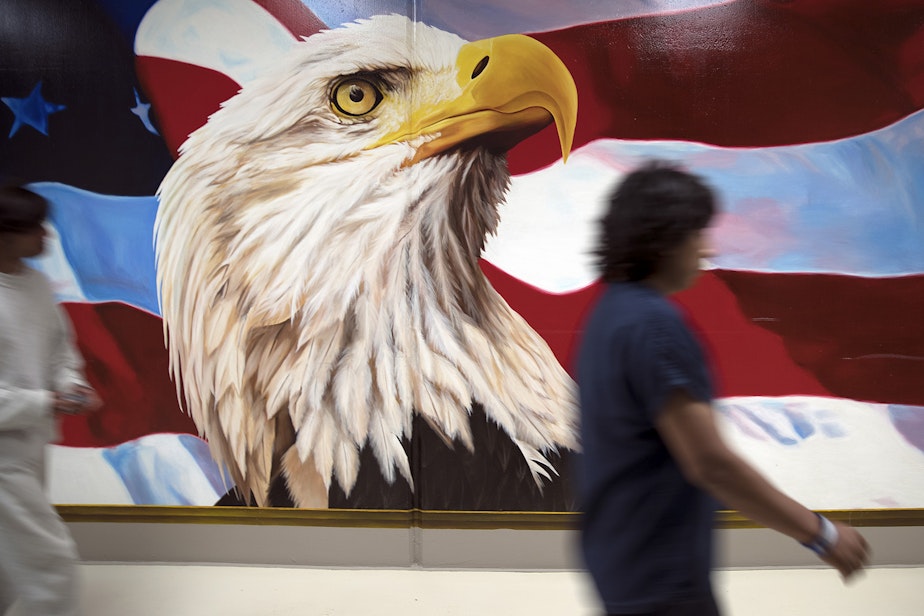How will Seattle's next mayor face Trump's immigration policies?

The policy changes came fast as President Donald Trump took office.
In Seattle, a city where roughly one in five people are immigrants, protests erupted. First, when Trump ordered a crackdown on so-called sanctuary cities for undocumented immigrants.
“I’m willing to lose every single penny to protect those people,” Seattle Mayor Ed Murray said to a cheering crowd in January.
Then, days later, thousands flooded Sea-Tac Airport in response to the president’s travel ban on refugees and travelers from some majority-Muslim countries.
Protesters banged drums, waved signs and chanted “let them in” as word spread that some arriving immigrants were detained or turned away.
Sponsored
Seattle took a high-profile stand on immigrant rights, especially as these rights came under fire during the Trump administration. Candidates for the next mayor will face new questions about the city’s role on immigration.
Common ground on immigration
So far, immigration is one topic where the six leading mayoral candidates seem to find some harmony.
Jenny Durkan: “I think we have to remain absolutely vigilant in checking Donald Trump’s anti-immigrant activity.”
Jessyn Farrell: “Standing up to the Trump administration is exactly the right thing to do.”
Sponsored
Bob Hasegawa: “If the federal government wants to do what it’s going to do, we can’t stop them. But we don’t have to help them.”
Mike McGinn: “We have to make a lot of choices about how we’re going to resist Trump.”
Cary Moon: “I would go further.”
Nikkita Oliver: “I think it’s important that we’re not only a sanctuary city, but we start to advocate for a sanctuary region.”
All six candidates said they’ll continue Seattle’s bold stand to protect immigrants. The question is, how?
Sponsored
Some issues they’ll grapple with are related to so-called "sanctuary policies" that cities use to stay out of immigration enforcement. For example, Seattle police don’t ask about immigration status.
Oliver is the only candidate who brought up a regional focus, saying she wants cities throughout King County to potentially align their policies. That would help people know what to expect if they’re stopped by police anywhere from SeaTac to Bothell, for example.
Candidates also echoed ways to bolster current city efforts to help people at risk of deportation.
“That means providing legal resources, education resources, refusing to comply with things like data collection where we can do that,” said Farrell.
Moon agreed that she wants to ensure Seattle police are not sharing data with U.S. Immigration and Customs Enforcement (ICE).
Sponsored
“We need to make sure we are standing up for legal rights, offering legal assistance for immigrants,” Moon said.
The city of Seattle recently created a legal defense fund to help immigrants and refugees with court issues, among other things. Immigrant advocates see this fund as a priority for the next mayor to support and help expand.
Hasegawa said he wants immigrants to have a greater say in how Seattle defines its sanctuary approach.
“Those people who we’re trying to protect should be at the table and helping us figure out how we’re going to keep them safe, and I don’t think those steps were followed,” Hasegawa said.
Hasegawa brings a personal perspective as the son of Japanese immigrants who were forced into internment during World War II.
Sponsored
Avoiding ICE's radar
Throughout Puget Sound region, there’s renewed debate about immigration consequences in criminal cases.
Even minor crimes, like driving without a license, can carry more risk for someone without legal status.
McGinn said he wants to consider softer penalties in these cases “so as to keep things off of the radar screen of Immigration and Customs Enforcement.”
“I think that’s something we have to look at again, to make sure that we are not putting people at risk for minor infractions,” he said.
Oliver, Farrell, Moon and Hasegawa also expressed support for the idea of decriminalizing certain low-level offenses.
“Absolutely, those are the things that put people into situations where they’ll never be able to dig their way out,” Hasegawa said.
The candidate with the most law enforcement background is Durkan, a former U.S. Attorney for Western Washington. In response to our question about decriminalizing some offenses, she talked instead about how to build trust.
“If witnesses or victims think that they or family members will be deported if they report a crime or cooperate, they will quit cooperating. And that will make communities less safe,” Durkan said.
The Trump administration threatened to cut funds from sanctuary jurisdictions, saying they hinder federal enforcement. Seattle fought back with a lawsuit, and the federal government has since walked back their approach.
Candidates for the next mayor appear eager to keep up the pressure.

